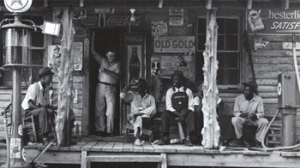
edited from Barry Lee Pearson’s “Appalachian Blues: Blues From the Mountains” (www.folkways.si.edu)
John Jackson noted that people in the mountains had a hard time telling if early recording artists were black or white, especially if they played black-derived material:
“You don’t know what they were—white people singing them or black people—who it were. There were no pictures and no names on most of them. And I know Blind Blake. After I got grown up, you could pick one out from the others and pretty much tell who it was. But we never did know Uncle Dave Macon was a white man until way later—always thought he was black. Everybody did around there.” (Jackson 1999)
Archie Edwards’ family bought blues records and also those by country artists such as the Carter Family, Uncle Dave Macon, Jimmie Rodgers, and Frank Hutchison. Both Archie and his father learned Hutchison’s “That Train That Carried My Girl from Town.” In the 1980s, I showed Archie a picture of Hutchison and he was shocked. “I never knew he was white,” he said.
Over in Tennessee Brownie McGhee’s family purchased records through the mail:
“You could buy from the Chicago mail-order house. That’s the only way you got a record. And you had to send in and order five records or more, and they ship them to you. They wouldn’t ship just one record. So when you saved up enough money together you’d get Carter Family, Jim Jackson, Leroy Carr, Bessie Smith, and Blind Lemon Jefferson. So you’d get an assortment of records. And this was the thing about it. And every month, or every other month, they’d send you this circular with who’s got the new releases.” (McGhee 1972)
According to Brownie McGhee, if you bought race records they would send you a race catalog; and if you bought a country record then you would get a country catalog:
“It was all black blues and then they’d send you a country and western thing if you ordered some of that, like Jimmie Rodgers. Now Jimmie Rodgers got famous down in there because all of that was black stuff he would sing. And Carter Family records— we had lots of them down there, way down in Tennessee, because they used to buy them because they did a lot of spirituals. And they [were] big sellers for them with the black people. “Will the Circle Be Unbroken,” all of that.” (McGhee 1972)
McGhee, Jackson, and Edwards grew up listening to blues and old-time country and learning from both. This, in part, accounts for the racially mixed repertoire and style of Appalachian blues performers. But, as Edwards, Jackson, and McGhee also noted, black listeners found the so-called country music very familiar. It was, as McGhee said, “black stuff in the first place.”
Read entire article here.
Leave a comment